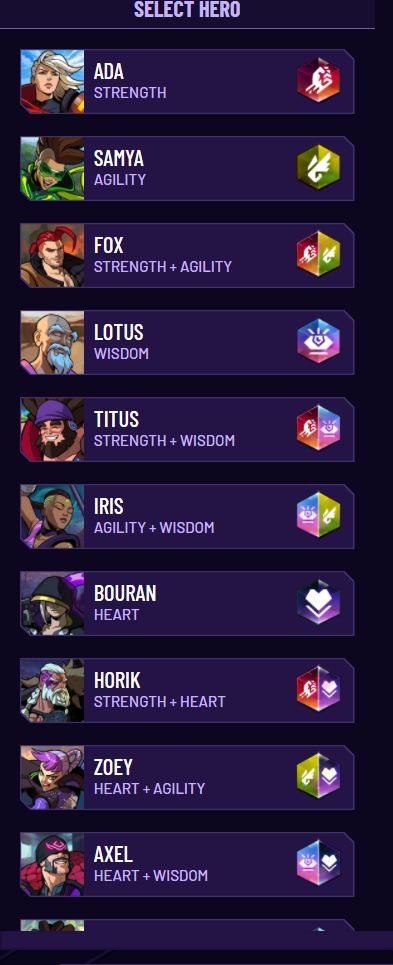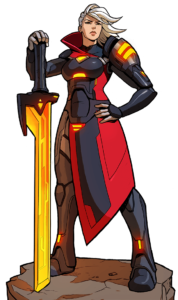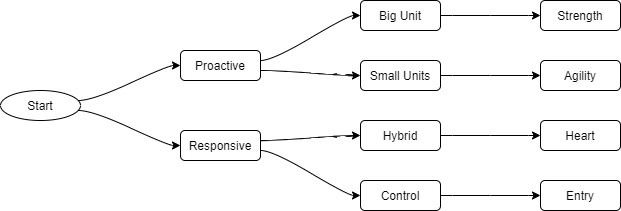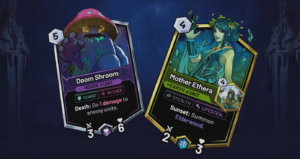Skyweaver Discovery Guide For Beginners By Lovertai
Discovery mode in a nutshell
Hi everyone i am lovertai, i have been playing sky since 2021 And i climbed to rank 1 in discovery in 3 weeks and wanted to share my experiences with you. In this guide we will touch upon some fundamental concepts in discovery mode. I wish you a plesant reading.
- You choose a hero.
- You receive a deck of 25 random cards from your hero’s prism(s)
- You win.
Simple isn’t it? It’s by far the most beginner-friendly mode, and also offers replayability for the Skyweaver pros
However, ‘you want to win’ does not necessarily mean you will win. Your opponent could outsmart you if you have little understanding of the game and this mode. Feel frustrated for your awful deck every single time? Possibly you are over-confident about your skill level!
But hey, feel free to beat me in discovery if I am wrong 😉
What are the main factors in Discovery?
- Your Deck: Mana curve, element synergy, etc. Your adaptation to its randomness.
- Your Hero: This dictates your playstyle and what type of cards you’ll get in your deck
- Your Skills: Utilise your hands, predict your draws, play combos, read your opponents and exploit their weaknesses… This will be discussed in the next part.
Your Deck
 Every random deck has its unique characteristics. You should expect to see random high-cost finishers in a mostly low mana cost deck, combo cards without combos, awful cards with poor stats and effects…and yes, you must create the best value of them.
Every random deck has its unique characteristics. You should expect to see random high-cost finishers in a mostly low mana cost deck, combo cards without combos, awful cards with poor stats and effects…and yes, you must create the best value of them.
In general, if we consider the deck as a whole, two crucial areas should be focused on first:
- Mana curve
- Tempo and Value
Mana Curve
The Mana curve of a deck refers to the mana cost distribution of cards within the deck. Because you don’t draft your deck, you will end up with a completely random mana curve when the game starts. Choosing your playstyle after taking the mana curve of your deck into consideration is a strong way to increase your win rate.
←——————————————————-|————————————————————>
Aggressive— — — —Midrange — — — — Control
~3 ~4/5 ~6
Aggressive (avg.cost ~3)
- Swarm the board with small units, take risks with your health, go face.
- Keep your early dominating board or
- Kill your opponent fast.
- Example: Samya (Agi)
Midrange (avg.cost ~4/5)
- control enough to delay aggro and aggro enough to outpace control.
- 90% of matches you will have a midrange deck, allowing you to pick your strategies flexibly.
- You usually have more options – thus you are looking for a balance between health, cards, and board.
- Example: Horik (Str/Hrt)
Control (avg.cost ~6)
- Controlling the board
- Keep in mind about your health gain and removal cards. These are your main resources to stall games
- Always predict and respond to your opponent’s next threat.
- Example: Lotus (Wis)
One more thing to keep in mind…
In Skyweaver, many creatures have a spell attached to them. You lose the spell if you don’t play the spell before it dies – an additional reason why removing units are more important in Discovery. Making use of them to create value or ignoring them to aggro your opponent’s hero is an important decision you may need to make at every turn.
Tempo or Value
Value = Making the most of each card that you play. I.e. getting the most ‘value’ out of your cards
Tempo = Making the board as advantageous for you as possible. Sometimes at the cost of value
In discovery, it’s best to adopt a mixed strategy to improve consistency and maximize your deck’s potential. However, prioritizing Tempo-based or Value-based play is a valid strategy as well.
Tempo-based strategy | Value-based strategy |
Frequent use of banner & hero attack | Effective unit trading |
Trade health/cards for board advantage | Utilize aoe spells in the deck for max value |
Spend all mana each turn | Play all spells attached to units immediately |
Play as many cards as possible | Wait until cards are most impactful to play |
Overextend just enough | Play greedy |
You will see in general which prisms follow a strategy better after you play more. Below are generalizations regarding what each prism tends to perform more effectively.
Prism | Tempo | Value |
Strength | Play on curve with best units | N/A |
Agility | Dominating with your speed | N/A |
Heart | Cheap to mid-cost revival | Grave management |
Wisdom | N/A | Everything |
Intellect | Cost-effective spells | Units with on-board effect |
Elemental synergy, Combos, Winning cards of each prism…
- Will be discussed in part 2 for intermediate players with a more advanced understanding of discovery
Your Hero
 Choosing your hero is to choose your preferred prism. Choosing your prism is to gain access to a set of cards that fit your preferred playstyle.
Choosing your hero is to choose your preferred prism. Choosing your prism is to gain access to a set of cards that fit your preferred playstyle.
Each prism has 100 cards in total, but your deck has 25 cards in your prism. So roughly speaking you are playing with one-fourth of cards in your single prism. Your probability of drawing a certain card is even lower if you choose a dual-prism hero. As you are drawing from cards in the two selected prisms (100+100)
Because of this, mono prism decks are more consistent but also easier for your opponent to predict and counter. Dual prism decks are more inconsistent in general, but a lot less predictable.
Mono Prism | Dual Prism | |
Pros | A more consistent deck that fits your prism’s theme | Access to second prism’s cards with that prisms threats, aoe, card draw, and finishers |
Relatively stable mana curve that suits your prism’s main objective | Elemental synergy and synergy between prisms | |
Learning to utilize a set of 100 cards is an easier learning curve. | More varied card pool makes it more difficult for your opponent to predict your playstyle. | |
Cons | Your opponents probably know your prism better than you. They may keep a removal spell for your threats, stop you from gaining tempo, and turn the tides. | Extremely inconsistent if looking for combos. |
You may lose hope if you fail to respond to a threat and are faced with a counter to your prism. Dual prisms can be better in this area. | Absurd to believe you will have a finisher (Titanic) or great board sweep (touch the sky). You have to stay alert and adapt to your deck. |
An example dual prism hero
 Mira is a Strength/Intellect dual prism hero. Strength is known for the best chunky units in and intellect spells are cheap and powerful.
Mira is a Strength/Intellect dual prism hero. Strength is known for the best chunky units in and intellect spells are cheap and powerful.
In an ideal situation where Mira plays strength units on curve and maintains strong board control via intellect spells, the opponent of a Mira player usually has no chance to fight back. However, in reality, this is probably not going to happen.
Intellect is also known for the worst units with the lowest stats, especially in the early game. Strength spells are alright but too situational and unfavorable to compare with spells in intellect.
Just like you have a chance of getting a deck with great STR units and INT spells , you have a chance of getting a deck with terrible INT units and STR spells.
It is not likely your deck has STR units or INT units only – A random deck always has mixed cards from both prisms. Having more low-cost int units or high-cost strength spells is not desirable for you, but you have no control over it.
As a result, a Mira player suffers heavily from inconsistency. Mira performs much better when she is gaining tempo and can be terrible without units on board. Hence, a small inconsistency like not getting the cards in the first three turns becomes devastating in discovery for Mira players.
If you are trying to climb ranks in discovery, you pick a hero for
1) higher consistency
2) higher maximum potential,
3) synergy between prisms (if any)
4) killing a specific prism (e.g. Agility performs better against Strength)
The main objective, pros & cons of each prism


Strength | |
Main objective | To accumulate board advantage with your powerful creatures. |
Playstyle | 1) Always pose threats on board and force the enemy to trade unfavorably. 2) Try your best to play on curve. 3) An opponent’s failure to remove your threats or having to trade unfavourably with units in the first 2-3 rounds can bring you victory 4) The match is usually determined by whether your opponent is able to clear your board successfully. |
Pros | +++ Unit with best overall stat +Stable removal spells (1 card for 1 card) +less vulnerable to aoe |
Cons | —Strength needs tempo to achieve its main objective, but strength fails to keep tempo on its own -Worst resource generation/card draw -Situational spells -Costly and unsafe card draw -Least options to strike back and turn the tide i.e. Proactive spells |
Comment | Strength should not be played as a mono prism (Ada) in Discovery. By going dual prism, you sacrifice the consistency of drawing strong units often, in exchange for the consistency of having a more reliable board presence (by agility’s early tactical removal, heart’s protection, and revival, wis & int spell, for instance). Also the alternative option to follow your other prism’s main objective allows you to play more flexibly. Strength is a strong support prism, especially when you get familiar with common removals in discovery and can play around them with your units. |


Agility | |
Main objective | You always outpace your opponent with offensive early game power and low cost flexible units and spells. |
Playstyle | 1) Eliminate your opponent before they can fully respond, especially if your deck has cards with direct damage 2) Maintain board control until striking a decisive finishing blow. Agility does not have a fixed opener. You are the person choosing to pose threats in successive turns or hold back the pace gently. |
Pros | +++ Always first to pose threats +Most consistent prism in discovery +safe transitions from early game to mid-game +Always have small units on board +Safest card draw options +Extremely versatile |
Cons | — Master players get too familiar with agility cards, can easily counter you – Low card value: low average card cost means smaller effects – Limited in hard removal – Weak board clears – Vulnerable to having your board cleared – Health management is key, some cards will damage your own hero |
Comment | Play Agility first! Agility is the most consistent and flexible prism in discovery. No matter if your deck has a low/middle/high mana curve, little or plentiful card draws, direct damage or aoe spells, you always find a viable strategy to make use of in your deck. In higher ranks, the weakness of mono agility can be exploited by your opponent, so combining agility with Strength’s powerful tempo or Wisdom’s late-game potential can be a strong choice. |


Heart | |
Main objective | 1) Manage and accumulate grave resources for great spells 2) Utilize your early power to control the board, and adapt a defensive strategy if you can’t win on tempo |
Playstyle | View your deck immediately. Your strategy highly depends on your deck. Group revival and finishers? Board Control. Good units with death effects? Plan beforehand Many cards with health gain and guard? Play aggressive against aggro prism. Bad starting hand? You should check if you have early removal and banner. None of the above? Be conservative and play for value. Heart is horrible at gaining momentum in early to mid game. |
Pros | +++ Heart prism is an all-rounder and your card on average has the best value if played properly. If agility is the most flexible prism for posing threats, heart is the most adaptive prism when responding to threats + (Above) average performance in early, mid, and late game |
Cons | — Heart has a hard time playing proactively. Being responsive is your strength, but also unfortunately can be your weakness too – Jack of all trades, master of none. – Your opponent can ‘manage’ your grave via dust and arranging attack order if they’re a high level player. |
Comment | I was highly skeptical of Heart’s performance in discovery. But I was wrong. If you are looking for a strong, tempo path to win, Heart sucks. But if you are looking for a prism with at least average performance in all stages of the game, Heart is your top choice. Heart requires players to be the most adaptive to their deck and responsive to their opponents plays. |


Wisdom | |
Main objective | Staying alive, removing threats, and getting to the late game. Your opponent loses automatically if they have no cards in their hands. |
Playstyle | Wisdom is a control prism by nature. You have all the cards you need to stay alive for the long run, stalling your opponent, drawing lots of cards, healing yourself and playing powerful board sweeps. Notice your rainbow element synergy. If you have them in your deck, Prismata, Sky Phoenix, and Meng’long are important cards for you. Holding a mana potion is usually better than using it early for tempo. |
Pros | +++ Wisdom has incredible board control and late-game potential. + The strongest board sweep in all prisms (but sometimes with downsides) + Unbelievable card draw power. Hard to lose from lack of draw. + Low attack, high health units with guard serve as roadblocks for stopping early aggro. + You have many health gain cards, enemies may be in trouble if they sacrifice too much to try to kill you. |
Cons | — Wisdom has cards but lacks options to pose threats on board. – Opponents are more flexible to choose starting cards if smart. – If your opponent establishes control on board, playing a wisdom unit has little impact on the board because they can kill it easily due to its low attack. – Fewer cards with banner. – As a result, you may play aoe for a single unit, just because you have no other viable option. – Situational spell/ with requirements. e.g. Insomnia, World Tree, prismata, Etherwail, Skychannel. and unfavorable cards e.g. Rosewater, Earth Warden, Take Root. |
Comment | Play wisdom to learn how to play in a control-oriented playstyle. Play wisdom if you want to master Agility. It is meaningless to explain too much – the deck is just what you will expect in a control deck. |


Intellect | |
Main objective | You expect to stop the opponent from gaining tempo. |
Playstyle | Intellect serves as an assistive prism that both counters your opponent’s main objective (if possible) and helps to achieve your alternative objective (if any). Accumulate card and board advantages from your great units with the sunset effect. Utilize your aggressive (than wisdom) removal spells to assist your units. |
Pros | ++ Units with on-board effect: (Starfield: Glory; Curious: On-board; Sunset: Hive, Shell Officer) + Aggressive AOE spell when comparing with Wisdom + Lots of card draws if having enough mana |
Cons | – Int early awful units and inconsistent spells. – Reliance on certain cards in a random deck. |
Neutral | +++/— : affinity for combo Copying units and spells can generate massive value if you succeed to play optimally, e.g. summon a copy of enigma golem or shell officer. You can, but most of the time it heavily relies on your luck to achieve a decent 2-card combo. Besides, overwriting vapor, playing spell when Mootichi or zam in play…It is feasible if your opponent fails to gain tempo, but it makes a random deck even more inconsistent.
+/-: special/weird spell design dead water card, hand size, left-most, reveal hand, set to 1power/health… Too special to explain in a few words here. |
Comment | The critical problem of intellect prism in discovery is — you are a weaker agility deck in the early game and a weaker wisdom deck in the late game if you aim to play in their style, then, why don’t you play them instead? That’s why I expect intellect to be a ‘tempo-breaker’ in discovery.
The affinity for combo and worst unit stats force players to consider how to maximize intellect’s potential or minimize intellect’s inconsistency. It is fun to play intellect, but so far I believe only Mai and Banjo are capable of high-level play. |
Recommended heroes in Discovery for newbies. Tl;dr Samya.

I play responsively, but I admit playing proactively is the easiest and fastest way to climb rank.
To climb the rank ladder faster and easier, good players must know how to answer two important questions: 1) Which heroes more players are playing consistently and 2) How to play them, or how to counter them.
- If you want to play units on curve every single turn, gain tempo, and destroy your opponents, choose Ada (Strength).
- It will make you more vulnerable to agility, the best prism in discovery for now.
- So, you may consider picking a)Fox (Str/Agi) to keep pace with Samya (Agility). You may also consider b)Horik (Str/Hrt) for effective unit protection and revival, or c)Titus (Str/Wis) for card draw and late-game potential.
- If you prefer a versatile strategy, choose Samya
 (Agility).
(Agility). - Choose a) Fox (Str/Agi) to establish better board control, or d) Mai (Agi/Int) to counter most units your opponent attempts to play.
- If you prefer a slower game, try Lotus (Wisdom), Ari (Intellect), or Banjo (Wis/Int).
- Heroes with undecided goals in the start like Zoey, Iris, and Alex are not recommended for new players, but they have their uniqueness to play with.
- Mira and Sitti…JUST NO. Most of the time you have a better alternative, and if you know them very well and plan for them, they are still too inconsistent to play with.
(Somehow I feel…Samya wins Fox, Fox wins Mai, and Mai wins Samya)
(I do have my explanation. However, it is a guide, not a comment section.)
This guide aims to help new players to learn the Discovery Mode from the ground up and to prepare the ground for more in-depth guides which other top players can share if they don’t need to elaborate too much on the basics.
After going through step 1) Choose your hero and step 2) Know your deck, in the next sequel, I will introduce more tips and tricks in discovery mode (each with an example) to outsmart your opponent – if they have not read this guide. Once again, this should merely serve as a stepping stone for you to discover what works for you.
I want to express my gratitude to those great guys for organizing this mess into a readable format. I really see your love and patience in this game!
Thank you for reading.







Can I translate this article into Korean and post it?
Hi Zygote:
First of all, congratulations for your article. Is a very useful and a great tool to beginners (like me), i will spread the word both for this webpage and for your article.
By the way, I may have your approval to translate your article into Spanish
thanks anyway for your work, and keep it up!!
Hey, thank you. Yes, you can translate it, just mention the site at the end 🙂
Very good guide! I started 2 days ago and was very lost, unfortunately at the moment there is not much content in Portuguese, however, your guides are very good and I hope you continue writing, good luck and merry christmas
Thank you so much and Merry Christmas. We are so happy about your comments 🙂